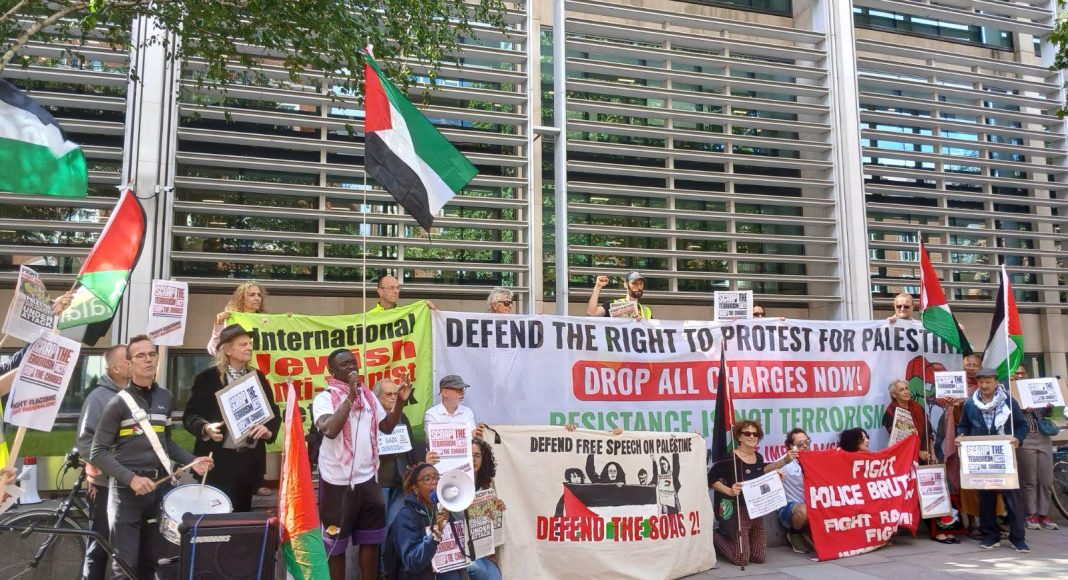Scrap the Terrorism Act
More than 1,400 people have been arrested in an escalating campaign of civil disobedience since the direct action group Palestine Action was proscribed on 4 July. More than 1,500 people have signed up for the next day of action on 4 October. The campaign involves standing peacefully holding a placard reading ‘I oppose genocide, I support Palestine Action’, in defiance of the ban. As of 5 September, 138 people had been charged, predominantly under Section 13 of the Terrorism Act, for taking part in the protests; they potentially face a hefty fine or up to six months in prison. However, despite the mass mobilisations for the event itself, there has to date been little in the way of an organised legal campaign for those charged. When the first three people to face charges – for taking part in the first protest on 9 July – appeared in Westminster Magistrates’ Court on 16 September, the Revolutionary Communist Group and Defend SOAS 2 Campaign were the only organisations to mobilise for a protest. We called for the scrapping of the Terrorism Act and the dropping of all charges. We will be present in Parliament Square on 4 October alongside other organisations such as CAGE International to call once again for the Terrorism Act to be scrapped and all charges dropped.
This is the same demand the Defend SOAS2 campaign, RCG and other organisations such as IJAN and Movement for Justice mobilised for outside the Home Office on 8 September, understanding that the act as a whole is a tool used by the British ruling class to target those organisations deemed to challenge its interests, including anti-imperialists, communists and national liberation movements.
When we fight we win
For those facing charges under Section 12 of the Terrorism Act, which criminalises ‘expressions of support’ for proscribed organisations and carries a possible sentence of up to 14 years’ imprisonment, a Supreme Court appeal hearing on 20 November could have major ramifications. The case is about whether Articles 10 and 11 of the European Convention on Human Rights – which concern freedom of expression, association and assembly – constitute a defence against Terrorism Act charges. The appeal judgment will be released in the first three months of 2026, meaning a number of trials have already been postponed, including those of Kwabena Devonish, a Cardiff-based Palestine solidarity activist, and Sarah of the SOAS2. Sarah will be at the Old Bailey on 7 November where the judge will consider arguments relating to the admissibility of expert evidence, some of which concerns the internationally recognised right of oppressed peoples to fight for national self-determination by any means necessary. It is vital to have as many people outside the court as possible on that day.
Recent victories show the importance of fighting back against British state attempts to criminalise solidarity. In early September, Yael Kahn, a Jewish activist born in Israel to parents who had fled Germany in the 1930s, had her case – that comparing Israel to Nazi Germany constituted ‘hate speech’ – thrown out, after being arrested twice and charged earlier this year. Yael has been consistent in mounting a political defence in her own case and supporting all those arrested for their solidarity with Palestine.
On 7 September Teuta Hoxha, one of the Filton 24 currently held in HMP Peterborough, won significant concessions from the prison system as a result of a 28-day hunger strike. They had embarked on this action in protest against the punitive measures taken by the prison, following its labelling of them as a ‘terrorist’. Hoxha won the reinstatement of their recreational activities, the receipt of mail that had been withheld, and written confirmation by the prison that their library job had been removed as a result of the proscription of Palestine Action. The Filton 24 are activists on remand accused of taking direct action against Elbit Systems, the largest Israeli weapons manufacturer. Prosecutors have conjured up an artificial ‘terrorism connection’ as a pretext for the implementation of harsh detention conditions and the denial of bail.
On 26 September, charges against Mo Chara (Liam og O’hannaidh) of the Irish rap trio Kneecap were thrown out, with the magistrate declaring them ‘null and void’. Mo Chara had been charged under section 13 of the Terrorism Act for allegedly waving a Hezbollah flag at a concert in 2024. His lawyers argued successfully that the charge had been brought after the end of the time limit for summary offences. While the case was dismissed on a legal technicality, this victory is testimony to months of sustained campaigning in support of Kneecap – which has consistently used its platform to inspire thousands not only to support Palestinian liberation, but also to oppose British imperialism in the occupied North of Ireland. What is won in court is first won on the streets. As he emerged victorious, Mo Chara told the crowd gathered to support him outside the court in Woolwich: ‘It was never about terrorism – a word used by your government to discredit people you oppress. It was always about Gaza, about what happens if you dare to speak up… If anyone is guilty of terrorism, it’s the British state. Free Palestine!’
This is the tradition on which we are building – a politically charged, principled, enthusiastic and organised fightback. Solidarity with all those arrested and facing prosecution, in Britain and around the world. Defend the right to defend Palestine!
Sarah Guebre-Egziabher
FRFI 308 October/November 2025




